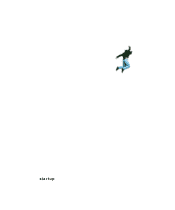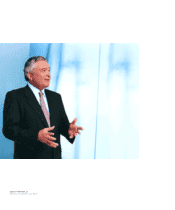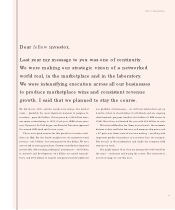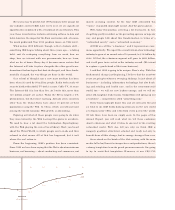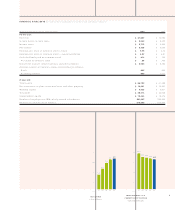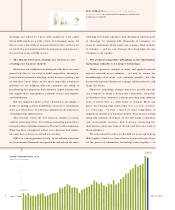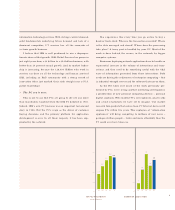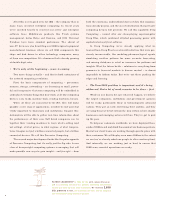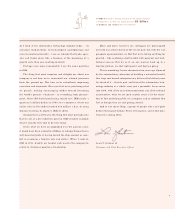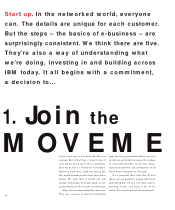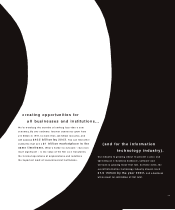IBM 1998 Annual Report Download - page 6
Download and view the complete annual report
Please find page 6 of the 1998 IBM annual report below. You can navigate through the pages in the report by either clicking on the pages listed below, or by using the keyword search tool below to find specific information within the annual report.
No year is easy to predict, but 1999 promises to be unique for
our industry and for IBM. Like every year, we see significant
opportunities combined with a truckload of uncertainties. This
year, those uncertainties include continuing softness in Asia and
Latin America, the impact of the Euro conversion and, of course,
the much publicized Year 2000 problem (more on Y2K later).
What makes 1999 different, though, is that a historic shift –
something IBM began talking about three years ago – is taking
hold, and it’s reshaping everything: how we work, how we
shop, how we interact with our governments, how we learn,
what we do at home. Every day it becomes more certain that
the Internet will take its place alongside the other great trans-
formational technologies that first challenged, and then funda-
mentally changed, the way things are done in the world.
One school of thought says a new mass medium has been
born when it’s used by 50 million people. Radio took nearly 40
years to hit that threshold. TV took 13 years. Cable TV, 10 years.
The Internet did it in less than five. As I write this, more than
140 million people are online. Today the Net is largely a U.S.
phenomenon, but that won’t last long. Already seven countries
other than the United States have about 10 percent of their
populations using the Web. In China, which is really just now
joining the world economy, Web growth is astonishing.
Figuring out what all those people were going to do when
they were linked by the Web has kept the gurus in overdrive.
We used to hear a lot about the Information Superhighway,
with the Web playing the role of local library. Next, you heard
about the Wired World, in which people sent e-mails and then
relaxed in chat rooms. All of that has happened, but it isn’t
where the real action is.
From the beginning, IBM’s position has been consistent.
Since 1995 we have been saying that the Net is about mainstream
business, not browsing – about conducting real commerce, not
merely accessing content. At the time IBM articulated this
“vision,” it sounded downright uncool. And the gurus said so.
Well, today this position is feeling a lot less lonely. In fact,
it’s getting pretty crowded, as the prevailing opinion swings our
way and people talk about this transformation in terms of a
“networked society” and a “networked economy.”
At IBM we call this “e-business,” and it represents an enor-
mous opportunity. We expect the overall information technology
industry to grow at an annual rate of 10 percent, to $1.6 trillion by
2002. Of that, the e-business segment will grow to $600 billion,
and it will grow twice as fast as the industry overall. (We intend
to capture a good chunk of that new business.)
I said that 1999 is going to be unique. Here’s why: With this
fundamental change just beginning, I believe that the next two
years are going to witness a sweeping shakeup. In just about all
businesses – including information technology, but also bank-
ing and retailing and health care, and in the noncommercial
world, too – we will see new leaders emerge, and we will see
some old, longtime leaders sink. Competitors will spring up out
of nowhere – competitors called “something.com.”
Savvy businesspeople know this and are intensely focused
on what to do. IBM holds daylong seminars on the new world
of e-business for CEOs and CIOs from every part of the world.
Of late there have been no empty seats. In the pages of this
Annual Report, you will read what we tell these customers
about e-business and what it takes to succeed in the evolving
networked world. We’ll also tell you why we think IBM is
uniquely qualified, structured, situated and ready not only to
benefit from all this change, but to emerge stronger than ever.
As we stand on the brink of the 21st century, with the mass
media full of millennial retrospectives and predictions, there’s
a strong temptation to make grand pronouncements. I’m going
to try to resist that temptation. However, at our CEO/ CIO
’98’97’96’95’94
81.7
78.5
75.9
71.9
64.1
REVENUE
($ in billions)

